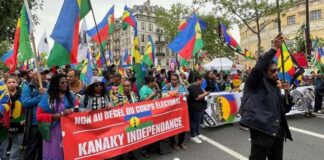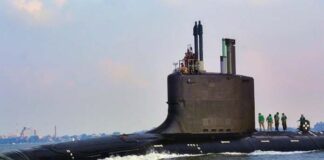The political crisis in PNG over Prime Minister Peter O’Neill’s alleged corruption continues to escalate. Workers staged strikes in July and O’Neill faced down a no confidence motion in parliament.
Riot police shot and wounded dozens of university students on 8 June, during a protest demanding that O’Neill step down and face due process in corruption allegations against him.
In mid-July a group called the Concerned Citizens Coalition representing workers in a number of industries issued a call on O’Neill to resign, before launching a series of strikes.
Airline pilots, maritime and public transport workers, energy workers, bank workers, doctors and health professionals all took part in strike action in Port Moresby, Lae and Mount Hagen. The PNG Trade Union Congress, however, did not back the action.
During the strike the PNG Supreme Court ordered Parliament to reconvene to vote on the no confidence motion. Before this, Parliament wasn’t set to meet for many months. No confidence motions have been used frequently in the past to remove Prime Ministers, with MPs often shifting their support to a new leader in the middle of parliamentary terms. O’Neill easily defeated the motion by 85 votes to 21, but faces a general election next year.
The initiative from those unions who made the strike call is an important development. But it’s difficult to assess their strength.
News reports in PNG said 70 per cent of pilots did not turn up to work by “calling in sick”, which had a real impact on flights. James Makop, a leader of the pilots told ABC News, “No man, not even the Prime Minister, who is mandated by us, by the people of Papua New Guinea, on borrowed power, can raise himself above the rest of us and say he›s above the law.”
Transport across the country was disrupted. As News Limited reported, “Poor roads through the thickly forested highlands that separate its few large cities mean that travellers are effectively stranded without air travel.”
Doctors announced that they would be dealing with emergency cases only in the lead up to the no confidence vote, although the Doctors Association called this individual “civil disobedience” action not strike action. The Association has called both for O’Neill to step down and for huge budget cuts of 40 per cent to the health budget to be reversed.
Dr Sam Yockopua, secretary of the Doctors Association, said, “about 80 per cent of Public Hospitals are literally struggling to keep their doors open due to lack of adequate supplies and consumables”.
There have also been delays in paying public servants and teachers their wages.
The level of government concern is shown by the fact that the PNG Defence force were mobilised in response to the strike threat.
O’Neill has brought increased political stability to PNG, remaining Prime Minister since August 2011 to become one of the country’s longest serving leaders. But if his efforts to cling onto office start to create ongoing social unrest, PNG’s ruling class, indigenous and ex-patriate Australian, will be weighing up whether he should stay on.
The riot police’s continued attempt to arrest students, who helped trigger the no confidence motion, is causing continued tension. Most student leaders have been forced to go into hiding or “gone bush”.
Eric Tlozek, ABC reporter in PNG said, “Australia gives more than half a billion dollars in aid each year to PNG, and the Australian Federal Police has 70 officers here providing training and support. Just one week after the students were shot, the AFP officially handed over a million dollars’ worth of housing to the police. But not just to any police—to the same division involved in the shooting.”
Economic demands
The student movement so far has simply demanded “out with O’Neill” without elaborating any wider political program. This holds the danger of placing faith in another corrupt figure from within PNG’s political elite as the solution. PNG still lacks a working class political party, even a Labor Party, which could begin to raise wider demands.
The action by unions shows the possibility of fusing the demand against political corruption with opposition to O’Neill’s savage budget cuts. This is the kind of politics that can end the enormous pain of the cuts and the neo-liberal agenda of all political parties.
The government faces serious economic problems due to the end of the commodities boom and far lower levels of economic growth. The number of jobs has gone backwards by 7 per cent since 2014.
Building solidarity with the movement in PNG can help encourage the emergence of working class and socialist politics in PNG.
By Tom Orsag





